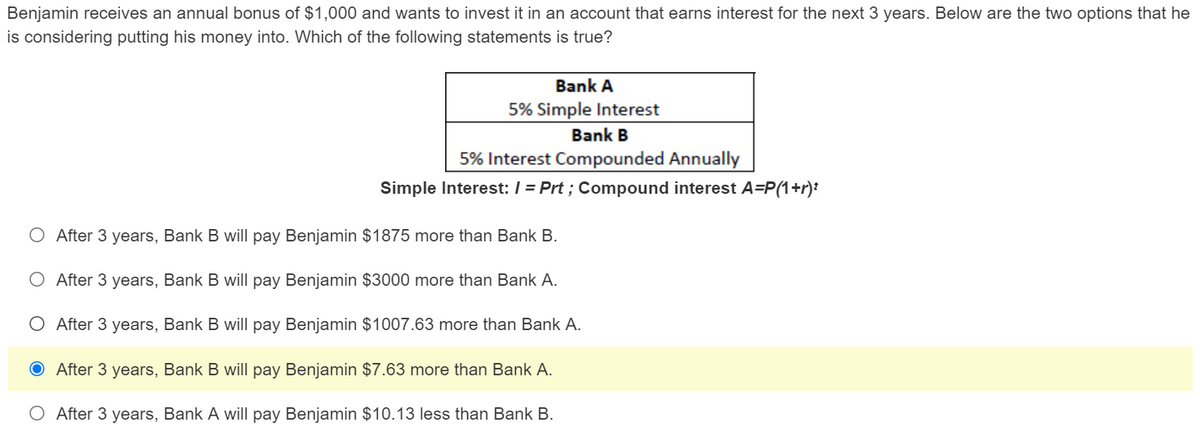Benjamin receives an annual bonus of $1,000 and wants to invest it in an account that earns interest for the next 3 years. Below are the two options that he is considering putting his money into. Which of the following statements is true? Bank A 5% Simple Interest Bank B 5% Interest Compounded Annually Simple Interest: / = Prt ; Compound interest A=P(1+r): O After 3 years, Bank B will pay Benjamin $1875 more than Bank B. O After 3 years, Bank B will pay Benjamin $3000 more than Bank A. O After 3 years, Bank B will pay Benjamin $1007.63 more than Bank A. O After 3 years, Bank B will pay Benjamin $7.63 more than Bank A. O After 3 years, Bank A will pay Benjamin $10.13 less than Bank B.
Benjamin receives an annual bonus of $1,000 and wants to invest it in an account that earns interest for the next 3 years. Below are the two options that he is considering putting his money into. Which of the following statements is true? Bank A 5% Simple Interest Bank B 5% Interest Compounded Annually Simple Interest: / = Prt ; Compound interest A=P(1+r): O After 3 years, Bank B will pay Benjamin $1875 more than Bank B. O After 3 years, Bank B will pay Benjamin $3000 more than Bank A. O After 3 years, Bank B will pay Benjamin $1007.63 more than Bank A. O After 3 years, Bank B will pay Benjamin $7.63 more than Bank A. O After 3 years, Bank A will pay Benjamin $10.13 less than Bank B.
Excel Applications for Accounting Principles
4th Edition
ISBN:9781111581565
Author:Gaylord N. Smith
Publisher:Gaylord N. Smith
Chapter27: Time Value Of Money (compound)
Section: Chapter Questions
Problem 1E
Related questions
Question
Benjamin receives an annual bonus of $1,000 and wants to invest it in an account that earns interest for the next 3 years. Below are the two options that he is considering putting his money into. Which of the following statements is true?
Second time submitting please make asap
Dont mind bubled answer was accident.

Transcribed Image Text:Benjamin receives an annual bonus of $1,000 and wants to invest it in an account that earns interest for the next 3 years. Below are the two options that he
is considering putting his money into. Which of the following statements is true?
Bank A
5% Simple Interest
Bank B
5% Interest Compounded Annually
Simple Interest: / = Prt ; Compound interest A=P(1+r):
O After 3 years, Bank B will pay Benjamin $1875 more than Bank B.
O After 3 years, Bank B will pay Benjamin $3000 more than Bank A.
O After 3 years, Bank B will pay Benjamin $1007.63 more than Bank A.
O After 3 years, Bank B will pay Benjamin $7.63 more than Bank A.
O After 3 years, Bank A will pay Benjamin $10.13 less than Bank B.
Expert Solution
This question has been solved!
Explore an expertly crafted, step-by-step solution for a thorough understanding of key concepts.
Step by step
Solved in 2 steps

Knowledge Booster
Learn more about
Need a deep-dive on the concept behind this application? Look no further. Learn more about this topic, finance and related others by exploring similar questions and additional content below.Recommended textbooks for you

Excel Applications for Accounting Principles
Accounting
ISBN:
9781111581565
Author:
Gaylord N. Smith
Publisher:
Cengage Learning



Excel Applications for Accounting Principles
Accounting
ISBN:
9781111581565
Author:
Gaylord N. Smith
Publisher:
Cengage Learning




Cornerstones of Cost Management (Cornerstones Ser…
Accounting
ISBN:
9781305970663
Author:
Don R. Hansen, Maryanne M. Mowen
Publisher:
Cengage Learning

EBK CONTEMPORARY FINANCIAL MANAGEMENT
Finance
ISBN:
9781337514835
Author:
MOYER
Publisher:
CENGAGE LEARNING - CONSIGNMENT